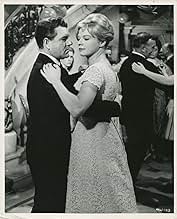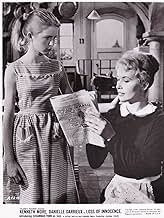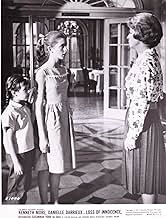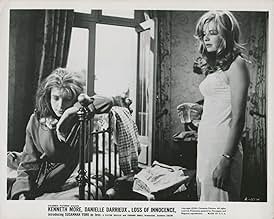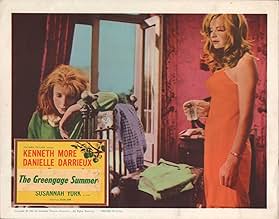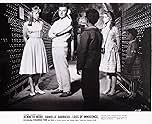IMDb RATING
6.7/10
632
YOUR RATING
Teenage Joss Grey vacations in France with her family. Her mother falls ill, leaving her in the care of a hotel manager having an affair with a charming older man towards whom Joss develops ... Read allTeenage Joss Grey vacations in France with her family. Her mother falls ill, leaving her in the care of a hotel manager having an affair with a charming older man towards whom Joss develops an attraction, transitioning from girl to woman.Teenage Joss Grey vacations in France with her family. Her mother falls ill, leaving her in the care of a hotel manager having an affair with a charming older man towards whom Joss develops an attraction, transitioning from girl to woman.
Raymond Gérôme
- Renard
- (as Raymond Gerome)
André Maranne
- Monsieur Dufour
- (as Andre Maranne)
Harold Kasket
- Monsieur Prideaux
- (as Harold Kaskett)
Jacques B. Brunius
- Monsieur Joubert
- (as Jacques Brunius)
Will Stampe
- Monsieur Armand
- (as Will Stamp)
Jacques Dhéry
- Bargee
- (as Jacques Dhery)
- Director
- Writers
- All cast & crew
- Production, box office & more at IMDbPro
6.7632
1
2
3
4
5
6
7
8
9
10
Featured reviews
Never Forgotten
I was only 10 when I saw this film but I'd been seeing films for around 3 years at least already so I really did understand what was going on, etc. For some reason, I OFTEN think of this movie and have been trying to remember the title for years to see if it's available for purchase. I can't wait to see how I like it now, 40 years later... for some reason that countryside is in my mind and I must see it again.
One of the loveliest of movies ever made...
This movie is my husband's favorite. He, the consummate movie buff, describes this movie as "nearly perfect" and "simply beautiful."
We have been searching for a copy of it for quite literally a decade. It does not appear to have ever been issued on videotape and it never appears on television, either.
If any of you just happen to know someplace where this wonderful movie might be available, please contact us!
We have been searching for a copy of it for quite literally a decade. It does not appear to have ever been issued on videotape and it never appears on television, either.
If any of you just happen to know someplace where this wonderful movie might be available, please contact us!
Beautiful film
Susannah York goes through "A Loss of Innocence" in this 1961 film, titled "The Greegage Summer" in England. Directed by Lewis Gilbert, "A Loss of Innocence" also stars Kenneth More, Danielle Darrieux, Jane Asher and Maurice Denham. When their mother becomes ill on vacation in France and has to be hospitalized, she tells her teenage daughter Joss (York) to go to the hotel with her three siblings. When they arrive at The Château, they are not welcome by the owner, Zisi (Darrieux), who doesn't like children in the hotel. However, her gentleman friend, Eliot (More) insists that they stay the night, and to make him happy, she agrees. Thanks to Eliot's intervention, they are allowed to continue to stay. The younger children grow very fond of him, and he of them. Joss has been staying in her room ill (probably with her period). When she finally emerges, no longer in the bedraggled state of the first evening. Eliot realizes she's not a child but almost a woman, and a beautiful one at that. There is an instant attraction.
It's hard enough to be growing up, in charge of your siblings in a strange place and with your mother ill, so Joss is unaware of the rumblings underneath this elegant hotel. For one thing, Zisi was involved in more than a business partnership with Madame Corbet (Claude Nollier) until Eliot came along. Needless to say, Corbet hates him, not to mention the fact that Eliot doesn't like guests in the hotel, so business is down. Zisi is violently jealous of Joss, who has no idea of it. And Eliot's business trips to Paris aren't all that they seem to be either. When he has a violent reaction to having his picture taken and changes his mind about a tour when he sees a policeman, Joss begins to get suspicious.
This is a stunning film about a young woman's first awareness of her affect on men and her first crush, and it's beautifully handled by Gilbert. Eliot never takes advantage of Joss and finds in himself qualities he didn't know he still had, both with her and with the children. Kenneth More has always been a wonderful actor; here is no exception - we get to see a complete, complex human being. Darrieux does a beautiful job as the cold, jealous and somewhat desperate Zisi, watching someone with the youth she no longer has and knowing she can't compete with it.
Ultimately the film belongs to the radiant York who perfectly portrays what it's like to think you're in love, come to hate the person you love with such a passion that it's obviously still love, and the resulting vengeful behavior. She's helped by the honesty of the script - everything rings so true. When Joss finally realizes she has loved and lost, she revels in the pain of it, dancing down the lane - when you're that age, there's nothing like the feeling of sophistication that the misery of love gives you.
One of those great, unappreciated films - perhaps with more showings on TCM, its status will grow.
It's hard enough to be growing up, in charge of your siblings in a strange place and with your mother ill, so Joss is unaware of the rumblings underneath this elegant hotel. For one thing, Zisi was involved in more than a business partnership with Madame Corbet (Claude Nollier) until Eliot came along. Needless to say, Corbet hates him, not to mention the fact that Eliot doesn't like guests in the hotel, so business is down. Zisi is violently jealous of Joss, who has no idea of it. And Eliot's business trips to Paris aren't all that they seem to be either. When he has a violent reaction to having his picture taken and changes his mind about a tour when he sees a policeman, Joss begins to get suspicious.
This is a stunning film about a young woman's first awareness of her affect on men and her first crush, and it's beautifully handled by Gilbert. Eliot never takes advantage of Joss and finds in himself qualities he didn't know he still had, both with her and with the children. Kenneth More has always been a wonderful actor; here is no exception - we get to see a complete, complex human being. Darrieux does a beautiful job as the cold, jealous and somewhat desperate Zisi, watching someone with the youth she no longer has and knowing she can't compete with it.
Ultimately the film belongs to the radiant York who perfectly portrays what it's like to think you're in love, come to hate the person you love with such a passion that it's obviously still love, and the resulting vengeful behavior. She's helped by the honesty of the script - everything rings so true. When Joss finally realizes she has loved and lost, she revels in the pain of it, dancing down the lane - when you're that age, there's nothing like the feeling of sophistication that the misery of love gives you.
One of those great, unappreciated films - perhaps with more showings on TCM, its status will grow.
The Kind Of Film They Don't Make Anymore
Greengage Summer (Loss Of Innocence, American release title) is a wonderful, nostalgic movie that I love to watch over and over again. How can you improve upon Kenneth More looking over at a blossoming Susannah York in one of her first films, tasting the perspiration on her face and saying sweetly: "Dew of Joss"? Sigh. So romantic!
The performances of all the children are first rate, and the actor who plays Paul is perfectly slimey for his part. You can almost smell him through the tv screen! In the novel by Rumer Godden I think there were two more children than in the movie, but who's counting? Best scenes: the French countryside, the sightseeing tour to the church, winery and the cafe, the dance scene at the hotel, and Eliot saying goodbye to Joss at the end. The movie also boasts rather gorgeous music that is available on CD. Check it out. I sounded out the main theme and play it on my piano quite often.
They just don't make films like this anymore, and if they tried to they would have the main characters in bed together in the first five minutes. Yuck. Give me yesterday, and understated romance over the tripe they call entertainment today.
The performances of all the children are first rate, and the actor who plays Paul is perfectly slimey for his part. You can almost smell him through the tv screen! In the novel by Rumer Godden I think there were two more children than in the movie, but who's counting? Best scenes: the French countryside, the sightseeing tour to the church, winery and the cafe, the dance scene at the hotel, and Eliot saying goodbye to Joss at the end. The movie also boasts rather gorgeous music that is available on CD. Check it out. I sounded out the main theme and play it on my piano quite often.
They just don't make films like this anymore, and if they tried to they would have the main characters in bed together in the first five minutes. Yuck. Give me yesterday, and understated romance over the tripe they call entertainment today.
A thoroughly enchanting little picture with winsome performances.
I saw this lovely little film shortly after it first appeared. It is a thoroughly charming and winning motion picture about first love, disillusionment, and acknowledgement, as the young and lovely Susannah York comes of age. She is absolutely winning in one of her first major roles. Kenneth More is superb as the object of York's unrequited affections, and Danielle Darrieux is splendid as More's jealous lover. Wonderful scenes of the French countryside (I remember especially a charming visit to a wine chateau) make this a delightfully wistful experience.
Did you know
- TriviaSeveral years after Kenneth More's death, both Lewis Gilbert and Susannah York said in interviews that More had been miscast in this film and that Dirk Bogarde would have been better in the role. However, More wanted very much to be in the film, precisely because the role would be an unusual one for him, and, nearing his fifties, he wanted to change his movie image and find more complex and mature parts.
- Crazy creditsOpening credits prologue: IN THE GREEN AND GOLD CHAMPAGNE COUNTRY OF FRANCE
- ConnectionsFeatured in Talkies: Remembering Kenneth More: Part One (2019)
- How long is Loss of Innocence?Powered by Alexa
Details
- Release date
- Country of origin
- Languages
- Also known as
- El fin de la inocencia
- Filming locations
- Gare SNCF, 28 Boulevard de Verdun, Béziers, Hérault, France(Madame Zizi steps out of the train)
- Production company
- See more company credits at IMDbPro
- Runtime
- 1h 39m(99 min)
- Sound mix
- Aspect ratio
- 1.33 : 1(original ratio)
Contribute to this page
Suggest an edit or add missing content

